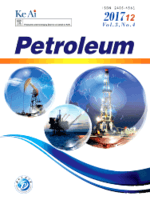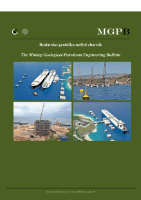
SOCAR Proceedings
Scope & Guideline
Bridging Disciplines to Tackle Global Energy Challenges.
Introduction
Aims and Scopes
- Hydrocarbon Exploration and Production Techniques:
Focuses on innovative methods for the exploration and extraction of hydrocarbons, including enhanced oil recovery techniques and drilling methodologies. - Geological and Geophysical Studies:
Investigates the geological formations and geophysical properties that influence oil and gas reserves, including tectonic influences and sedimentology. - Reservoir Management and Optimization:
Covers strategies for managing oil and gas reservoirs to maximize production efficiency and sustainability, including modeling and simulation approaches. - Environmental and Safety Concerns:
Addresses issues related to environmental protection, safety measures in oil and gas operations, and the impact of petroleum activities on ecosystems. - Technological Innovations in Oil and Gas:
Explores advancements in technology that enhance production processes, improve equipment efficiency, and facilitate the management of oil and gas operations. - Economic and Policy Analysis:
Examines the economic aspects of oil and gas production, including market analysis, investment strategies, and regulatory policies affecting the industry.
Trending and Emerging
- Sustainable and Green Technologies:
There is an increasing focus on sustainable practices in oil and gas production, including the use of environmentally friendly materials and methods to reduce ecological impact. - Advanced Computational Modeling and Machine Learning:
Research utilizing machine learning and advanced computational methods for predicting reservoir behavior and optimizing production strategies is on the rise. - Carbon Capture and Utilization:
Emerging themes include carbon capture technologies and their integration into oil and gas operations, focusing on reducing greenhouse gas emissions. - Enhanced Oil Recovery Techniques:
There is a growing interest in innovative enhanced oil recovery methods, particularly those utilizing nanotechnology and new chemical formulations. - Digital Transformation and Automation:
The integration of digital technologies and automation in oil and gas operations is becoming a prominent theme, reflecting the industry's shift towards more efficient and data-driven practices.
Declining or Waning
- Traditional Oil Recovery Methods:
There is a noticeable decrease in research focused solely on conventional oil recovery methods, as the industry shifts towards more innovative and sustainable practices. - Basic Geochemical Analysis:
Research on fundamental geochemical properties without advanced applications or implications appears to be declining, as the field moves towards more complex analyses that integrate modern technologies. - In-depth Studies of Historical Reservoirs:
Interest in comprehensive studies of historical oil fields seems to be waning, potentially due to a growing focus on new explorations and modern reservoir management techniques. - Regulatory Compliance and Standard Procedures:
Research related to standard operating procedures and compliance has decreased, possibly indicating that these aspects are now considered commonplace and less novel for academic exploration.
Similar Journals

PROCESS SAFETY PROGRESS
Innovating solutions for a safer tomorrow.PROCESS SAFETY PROGRESS is a distinguished journal published by WILEY, focusing on the critical intersections of chemical engineering and safety, risk, reliability, and quality. Established in 1993, this peer-reviewed journal serves as a significant platform for disseminating high-quality research findings and innovative solutions in process safety. With an established impact within its fields, it holds a Q3 categorization in both Chemical Engineering and Safety, Risk, Reliability and Quality as of 2023. The journal's rigorous manuscript evaluation process, combined with its emphasis on emerging challenges and solutions in industry practices, makes it a crucial resource for researchers, industry professionals, and students alike. Although not Open Access, PROCESS SAFETY PROGRESS continues to enhance its visibility through its indexed presence in Scopus, where it ranks in the 50th percentile in its categories. As it converges to its 2024 volume, the journal remains committed to promoting advancements in the field and fostering a safer environment in chemical process engineering.

Petroleum
Advancing sustainable energy solutions through cutting-edge research.Petroleum, an esteemed open-access journal published by KEAI PUBLISHING LTD, serves as a premier platform for disseminating high-quality research in the fields of energy engineering, fuel technology, geology, and related earth sciences. Established in 2015, the journal exemplifies innovation and scholarly rigor with a commendable ranking in the second quartile across multiple categories, including Energy Engineering and Geopolitics. With a focus on advancing knowledge and practices in the petroleum sector, it encourages submissions that encompass a broad spectrum of topics from exploration and extraction techniques to environmental impacts and sustainability measures. Based in Beijing, China, this journal's impact is further enhanced by its significant presence in the Scopus database, achieving impressive percentiles, such as the 95th for Geology and 93rd for Geochemistry and Petrology. The open-access model fosters unrestricted global collaboration and accessibility, making the latest research available to a diverse audience of researchers, professionals, and students eager to innovate and lead in the burgeoning energy landscape.

Rudarsko-Geolosko-Naftni Zbornik
Navigating the Complexities of Earth's ResourcesRudarsko-Geolosko-Naftni Zbornik, the esteemed journal published by the University of Zagreb's Faculty of Mining, Geology and Petroleum Engineering, serves as a vital platform for advancing knowledge in the fields of Earth sciences, energy, and geology. With an ISSN of 0353-4529 and an E-ISSN of 1849-0409, this open-access journal has been disseminating high-quality research since 1989, contributing significantly to scientific discourse in Croatia and beyond. As of 2023, it holds an impressive categorization in various quartiles, notably achieving Q2 in Earth and Planetary Sciences and Q3 in several related domains, showcasing its relevance and impact within the academic community. The journal's commitment to quality is reflected in its Scopus rankings, placing it in competitive positions across diverse disciplines. Researchers, professionals, and students alike will find invaluable resources and insights that foster innovation and collaboration in their respective fields, making Rudarsko-Geolosko-Naftni Zbornik an essential read for those dedicated to exploring the complexities of natural resources and environmental challenges.

Petroleum Exploration and Development
Advancing the Frontiers of Petroleum SciencePetroleum Exploration and Development is a premier open-access journal published by KEAI PUBLISHING LTD, dedicated to advancing the fields of petroleum exploration and extraction as well as associated technologies. Since its inception in 2008, the journal has established itself as a key resource for researchers and professionals across various disciplines, evidenced by its impressive Q1 rankings in multiple categories including Economic Geology and Energy Engineering. With an impact factor that reflects its high citation rates and academic significance, this journal offers a unique platform for disseminating cutting-edge research related to geological studies, geochemistry, and energy sustainability. By making all its content freely accessible, Petroleum Exploration and Development ensures that its findings are available to a global audience, fostering collaboration and innovation within the community. Researchers, industry professionals, and students will find valuable insights and advancements in the realm of petroleum science, making it an essential part of their academic and professional libraries.

Geoenergy Science and Engineering
Bridging Disciplines for Energy AdvancementGeoenergy Science and Engineering, published by Elsevier in the Netherlands, is a burgeoning academic journal dedicated to the interdisciplinary exploration of geoenergy technologies. With ISSN 2949-8929 and E-ISSN 2949-8910, the journal serves as a crucial platform for disseminating research and advancements in the fields of energy engineering, geotechnical engineering, and sustainable energy practices. Spanning years from 2023 to 2024, it aims to publish high-quality original research, reviews, and case studies that address the pressing challenges and innovations within the realm of geoenergy. Although the journal currently holds modest Scopus rankings, it is poised to increase its impact and recognition in its respective fields, making it an essential resource for researchers, professionals, and students engaged in the urgent quest for sustainable energy solutions.

CT&F-Ciencia Tecnologia y Futuro
Transforming research into impactful solutions.CT&F-Ciencia Tecnologia y Futuro, a distinguished open-access journal published by ECOPETROL SA, serves as a vital platform for the dissemination of innovative research and advancements in the fields of chemical engineering, energy, fuel technology, and the broader disciplines within the geosciences. Established in 1996 and operating continuously until 2023, this bilingual journal aims to foster collaboration and knowledge exchange among researchers, professionals, and students in Colombia and beyond. With an increasing emphasis on sustainability and renewable energy, CT&F aligns with contemporary academic priorities and societal challenges. Although currently ranked in the Q4 category across multiple disciplines, the journal remains committed to enhancing its impact and accessibility, providing researchers with valuable insights and a significant forum to share their findings, all under the auspices of open-access since 2009. Explore a wealth of research as you contribute to the ongoing dialogue shaping the future of science and technology.

Gas Science and Engineering
Exploring Innovative Solutions in Gas EngineeringGas Science and Engineering is a premier academic journal published by Elsevier, dedicated to advancing knowledge in the critical domains of energy engineering, fuel technology, and geotechnical engineering. With a notable impact factor that underscores its significance in the field, this journal provides a platform for researchers, professionals, and students to explore cutting-edge research and innovative methodologies. As evidenced by its strong performance in Scopus rankings—placing within the top quartiles for various categories—the journal is recognized for its rigorous peer-review process and commitment to open access, allowing for wider dissemination of knowledge. Based in the Netherlands, Gas Science and Engineering aims to foster collaboration and discussion among scholars and industry experts, making it an essential resource for anyone engaged in the study of gas sciences and related fields.

CHEMISTRY AND TECHNOLOGY OF FUELS AND OILS
Advancing the Science of Energy SolutionsCHEMISTRY AND TECHNOLOGY OF FUELS AND OILS, published by SPRINGER, is a pivotal journal dedicated to advancing the understanding and technologies surrounding fuels and oils. With its ISSN 0009-3092 and E-ISSN 1573-8310, this journal has been a reliable resource in the field since its inception in 1965, providing insights into the latest research and developments up until 2024. While it currently holds a Q4 status across various quartiles, including Chemical Engineering and Fuel Technology as of 2023, the journal's commitment to disseminating valuable knowledge plays a crucial role in nurturing the academic discourse surrounding energy and chemical processes. Although it does not offer Open Access, the journal is critical for researchers, professionals, and students aiming to deepen their expertise in energy engineering, chemical engineering, and fuel technology. Its contributions underlie significant advancements in sustainable energy practices and fuel innovations, making it an essential read for those engaged in these crucial scientific domains.

SPE RESERVOIR EVALUATION & ENGINEERING
Innovating Energy Solutions through Rigorous ResearchSPE RESERVOIR EVALUATION & ENGINEERING, published by the Society of Petroleum Engineers, is a leading academic journal that plays a pivotal role in the fields of energy engineering and geology. With a notable Q2 ranking in Energy Engineering, Fuel Technology, and Energy (Miscellaneous), as well as a Q1 ranking in Geology, this journal is recognized for its high-quality, peer-reviewed research contributions that enhance our understanding of reservoir evaluation and engineering practices. Since its inception in 1999, the journal has aimed to disseminate innovative techniques and methodologies applicable to both academia and industry. Available in both print (ISSN: 1094-6470) and online (E-ISSN: 1930-0212) formats, it ensures wide accessibility to its content even as it embraces Open Access options for select titles. Researchers, professionals, and students alike can benefit from the rich repository of technical papers, case studies, and reviews, all designed to advance knowledge and applications in the ever-evolving energy sector.

Upstream Oil and Gas Technology
Exploring New Frontiers in Oil and Gas TechnologyUpstream Oil and Gas Technology, published by Elsevier, is a leading journal dedicated to advancing knowledge and innovation in the upstream oil and gas sector. With an ISSN of 2666-2604, this journal offers insightful research articles and critical reviews from 2019 to 2023, creating a valuable repository of knowledge for professionals and academics alike. Strategically positioned in the Q2 quartile of various related fields, including Chemical Engineering, Fuel Technology, and Geophysics, it holds impressive Scopus rankings, such as Rank #30 in Geophysics, demonstrating its significant impact within the scientific community. Although currently not operating under an open access model, the journal remains accessible through institutional subscriptions, ensuring that essential research is readily available to those in the industry. The editorial objectives focus on promoting high-quality research that addresses contemporary challenges in exploration, production, and sustainable practices within the upstream oil and gas domain, making it an invaluable resource for researchers, students, and industry professionals.